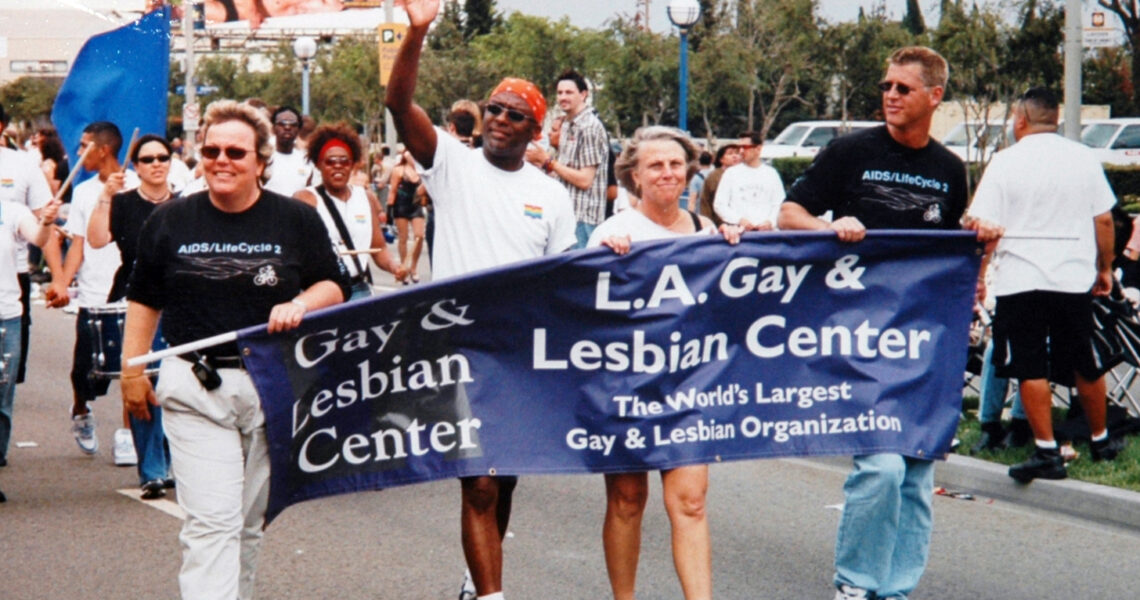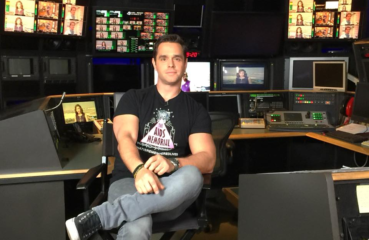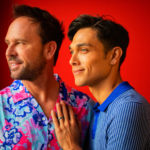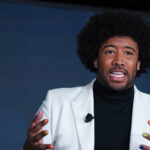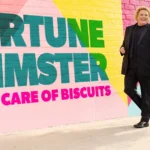In September of 2020, it was announced that the Los Angeles LGBT Center would begin its search for a successor to CEO Lorri L. Jean who, at the time of retirement in July of 2022, will have served the Center for more than 25 years. A bittersweet moment for the community, for sure, as Jean has become the face of the Center and, together with her team, has solidified the organization as the world’s largest and most complex LGBTQ institution, larger than 95 percent of all nonprofit organizations in the country.
No matter how many times you have met her, there is nervousness when approaching her, keeping in mind the scope of what she has done for the community and beyond. But, as always, the nerves disappear as she turns to you, smiles, and shakes your hand. Whether you are a donor, a volunteer, or someone in need of the many services the Center has to offer, she puts you at ease and it’s like talking to a friend. Activism isn’t just her job, it’s in her blood.
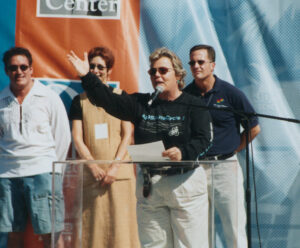 I was an activist since the time I was a little girl. My mom always told me that I had a keen sense of injustice and wanted to do things, to help people who needed it. But my first act of activism and organizing was in junior high when I led up a petition drive, demanding that girls be allowed to wear pants to school.
I was an activist since the time I was a little girl. My mom always told me that I had a keen sense of injustice and wanted to do things, to help people who needed it. But my first act of activism and organizing was in junior high when I led up a petition drive, demanding that girls be allowed to wear pants to school.
Jean has been an activist for LGBT issues since the age of 22. She served as the lead plaintiff in the successful landmark lawsuit against Georgetown University to prohibit discrimination based on sexual orientation. She also was the first openly gay person in history to receive a top-secret security clearance from the Central Intelligence Agency. In 1989, with her appointment as Deputy Regional Director of the Federal Emergency Management Agency (FEMA), she became the highest-ranking openly gay or lesbian person in the Federal government (a distinction she held until 1993 when President Clinton appointed Roberta Achtenberg). It was 1993 when she would first come to the Center. Her new arrival didn’t give her much time to settle in.
I remember it very well. Among the biggest challenges were financial. The organization had suffered a deficit before I arrived. And part of my negotiation with the Board for that first term of my contract was how long would I have to repay the deficit? Then I got on Board and started digging into the finances and discovered that the organization was headed for another, very significant deficit that I needed to try to fix before the end of the fiscal year. So, money was on my brain a lot at the very beginning, but then I had some other things like adjusting to the culture. I’d been an attorney for the federal government and now I was working for a queer organization and that was very, very different. And, and of course, I had to learn LA because I moved to Los Angeles to take the job.
The first Center, originally called The Gay Community Services Center, was located in an old Victorian house on Wilshire Boulevard and was the first non-profit in America to have the word “gay” in its name. Today, the Center employs almost 800 workers over a number of facilities and though the scope of the organization has gone global with a $141 million annual budget, the heart of the Center remains the same.
I would say the mission has remained the same that our founders had when they first started providing service in 1969. It was always about building a world where LGBT people thrive, but HOW we do it has changed pretty significantly. We’ve expanded dramatically. The biggest change during my tenure has been our medical care operation – we are a full-fledged, federally-qualified health center. Now, we are providing affordable housing for youth and seniors. Back then, we just had a sort of transitional living program shelter for youth experiencing homelessness. We have a robust policy department, and we never had that before. The senior services department is one of our fastest-growing departments. We now have 10 locations across town; there was basically one when I started. We have lots of dedicated services for the transgender members of our community. Trans folks have been involved with the Center from the very beginning, but now we’ve really focused on trans-specific services and a dramatic expansion in our youth programs.
In looking back at years of accomplishments, is it is impossible to narrow down Jean’s most proud moments.
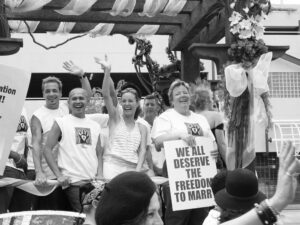 I’m proud of so many things that I and my team have done together. But I’m really proud of how much we’ve diversified our staff and our leadership. When I started, there was only one person of color in all of the managerial positions at Center, and there weren’t any transgender people, and probably about 25% people of color on the staff and 75% white folks. Now, that’s pretty much reversed. Our management includes many more people of color, many transgender folks. We still have a lot of ground to gain there, but I’m really proud of the progress that we’ve made. I’m proud of the fact that we’ve expanded our geographical reach and we’re in a lot more places now than just Hollywood and West Hollywood. We’re in Boyle Heights, we’re in Korea Town, we’re in South Los Angeles, and we’re a lot easier for folks to get to. I’m also really proud of our policy impact. We’ve played a major role in legislative gains and at both the local and the state and national levels. I would say that we’ve worked really hard to be a good team player with our sister organizations, LGBT and others, but mostly I’m thinking about LGBT and AIDS service organizations, and we really value those relationships. And then, of course, I have to say, the Anita May Rosenstein Campus (the world’s first intergenerational facility serving LGBT Seniors and Youth), that’s the sort of the jewel in the crown for me.
I’m proud of so many things that I and my team have done together. But I’m really proud of how much we’ve diversified our staff and our leadership. When I started, there was only one person of color in all of the managerial positions at Center, and there weren’t any transgender people, and probably about 25% people of color on the staff and 75% white folks. Now, that’s pretty much reversed. Our management includes many more people of color, many transgender folks. We still have a lot of ground to gain there, but I’m really proud of the progress that we’ve made. I’m proud of the fact that we’ve expanded our geographical reach and we’re in a lot more places now than just Hollywood and West Hollywood. We’re in Boyle Heights, we’re in Korea Town, we’re in South Los Angeles, and we’re a lot easier for folks to get to. I’m also really proud of our policy impact. We’ve played a major role in legislative gains and at both the local and the state and national levels. I would say that we’ve worked really hard to be a good team player with our sister organizations, LGBT and others, but mostly I’m thinking about LGBT and AIDS service organizations, and we really value those relationships. And then, of course, I have to say, the Anita May Rosenstein Campus (the world’s first intergenerational facility serving LGBT Seniors and Youth), that’s the sort of the jewel in the crown for me.
What would she tell herself on her first day of work in 1993?
Put more money away for retirement? Ha! I guess I would say don’t be afraid to do the things that nobody’s ever done and that you can achieve more than anybody ever thought possible. And I’d say that’s what I’ve learned over the years is to dream big because if you dream big, you can do it.
Jean left the Center after six years to serve as Executive Director of the National Gay and Lesbian Task Force. But, as much as she had started to change the landscape of the Center, it had changed her. She returned two years later and, personally, would never be the same again.
I’ve always been happy in my work, but this has been a true labor of love. It’s been my personal passion. When I really learned this is when I went and ran the National Gay and Lesbian Task Force. They do really important work and when I left the Center, I didn’t think I’d go do movement work again, but I missed it. And then when I went to the Task Force, I realized it wasn’t just movement work I missed, it was the Center’s phenomenal combination of policy advocacy and service. That’s what flips my switch. I love that so much more than just pure advocacy or just pure service. The combination is powerful. So that’s made me happier.
I also say that when I started working at the Center, I was a teetotaler. I didn’t drink alcohol and now I have a wine collection. And, finally, I’d say I was always pretty brave, but I’ve become so much more courageous in this work. Partly because I’ve had to, because our community has needed it and partly because I began to learn that when you’re courageous, it can really pay off. So, I’d say those are the ways that I’ve changed. And gaining weight and losing weight. Ha!
Being the figurehead for the Center comes at a cost. For Jean, there’s never really been time off or room for a personal life. During historical times for our community (good and bad), in front of media, politicians, the straight community, and donors, she’s had to put her best politically correct foot forward. How has she dealt with the pressure of being one of the most influential people in our community?
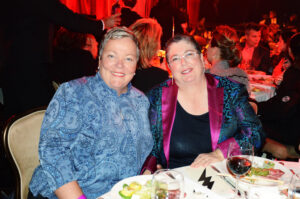
BEVERLY HILLS, CA – MAY 18: (L) L.A. Gay & Lesbian Center executive director Lori Jean and her wife Gina Calvelli attend the L.A. Gay & Lesbian Center’s 2013 “An Evening With Women” gala at The Beverly Hilton Hotel on May 18, 2013 in Beverly Hills, California. (Photo by Beck Starr/WireImage) Lori Jean; Gina Calvelli
A good red wine helps. I have a phenomenal partner in my wife, Gina, who has been with me throughout and she has been a real grounding force and supportive the whole way. She never punished me for how all-consuming this has been. Wonderful friends, including my #2, Darrel Cummings, my Chief of Staff. He and I have been joined at the hip the whole way and I couldn’t have done it without him.
Jean has two passions that will take precedence after retirement.
Travel and art. I’d like to travel more and not have to rush back in two weeks and see more of the world in a different way. Because of how all-consuming this job has been, I haven’t ever gotten to pursue other interests. And one of the things I want to pursue is, my artistic talent inherited from my mother. She was an artist, but I’ve never really taken the time to refine it and learn how to express it. So, I want to do more of that.
Who could imagine that Jean’s final year would deal with a pandemic and the aftermath of Trump’s administration? Like a superhero, she and her team have been able to provide hope and services throughout. No one has been left behind. And yet, the biggest obstacle from Jean’s legacy has come from our own backyard.
I would say the only few times I’ve had activism fatigue have been when I felt our community was turning on itself and was experiencing community cannibalism. Oftentimes when the most marginalized people are under the greatest pressure, they go after each other rather than going after the real enemy. It feels safer to attack your own, and I think that that’s not in our best interest as a community, it’s not in our best interest as a movement, it’s not in the best interest of progressive people. We need to learn how to come together and work together on the things that we do agree on, even if we don’t agree on things 100%, because at least we’re allies.
The plan was always for Jean to finish her contract in 2022 at the age of 65. In a unique transition, Jean will work with the incoming CEO, Joe Hollendoner, for a year before retiring. The two have worked together for five years since he took over the helm of the San Francisco AIDS Foundation. Lorri L. believes the Center is ready for fresh eyes and fresh leadership. The road ahead may be bumpy.
In some respects, I think it’s going to be harder. Many in our community can be out and more accepted at more places than ever before, they might think the fight’s over. We have made enormous progress, but if the Trump administration showed us anything, it is how fragile our progress is. We must keep fighting. I’ll use a good dyke, football analogy. We’re playing in a football game where we’re winning and we’re on the 20-yard line, we’re trying to get in for that final touchdown to win the championship. It’s always a lot harder to make progress in those last 20 yards.
The religious and political extremists in our country, even though they are small in number, are powerful and influential. They are fighting hard to do everything they can to impose new laws and other things that will impact our progress. We’re really going to have to work hard in that regard. I also think that going forward, our work is going to be more inclusive and more intersectional with other progressive movements. When I started at the Center, I would often have some members of the community complain to me that the Center was getting involved in things that they said weren’t gay issues. I have never subscribed to that belief. I’ve subscribed to the belief that all issues are LGBTQ issues because LGBTQ people are everywhere. Immigration has been one of the most controversial elements. We’ve lost a few donors over our work in and on behalf of immigrant rights. But when you look at who is often suffering in other countries and is coming to the US to seek asylum, it’s disproportionately LGBT people. And so, I think now more in our community are realizing, look, we’ve got to all come together. I think our movement is going to be more that way going forward.
Her message to the community as she prepares for her final year is clear:
Our progress is fragile. We can’t afford to let up until we have cemented our progress so that we don’t lose what we’ve gained when the political winds change. We know that most of the country is with us, but we’ve got to get them to understand why some of these efforts to allow religious people to discriminate against us is not what America’s all about. We didn’t allow it with race. We can’t allow it with sexual orientation or gender identity either. We must take this the rest of the way and make our gains embedded in the fabric of our society.
No doubt Lorri L. isn’t going to disappear, but she is going to rest. She’s already been asked to participate on a number of boards, to which she has said no. She’ll decompress, travel, and paint, and when she makes a return, it may not be in the way we expect and we may not even see it, but her energy will be there. She will continue to mentor other CEOs as long as she can, continuing to shape the community in her special way. Her first day off?
Oh my gosh. Well, I probably won’t be able to sleep late because I’ll wake up thinking I have to be up like I do every day. I think my ideal first day is going to be probably spending some time with a couple of my long-time board members and Darryl (Cummings), and just marveling at what a journey it’s been. We have so much to be proud of. I’m so looking forward to marveling at how Joe Hollendor will pick up the torch and just run with it. I know he’s going to build on the foundation that I and my team have built.
You can find out more about the Center at lalgbtcenter.org
Last modified: June 8, 2021

